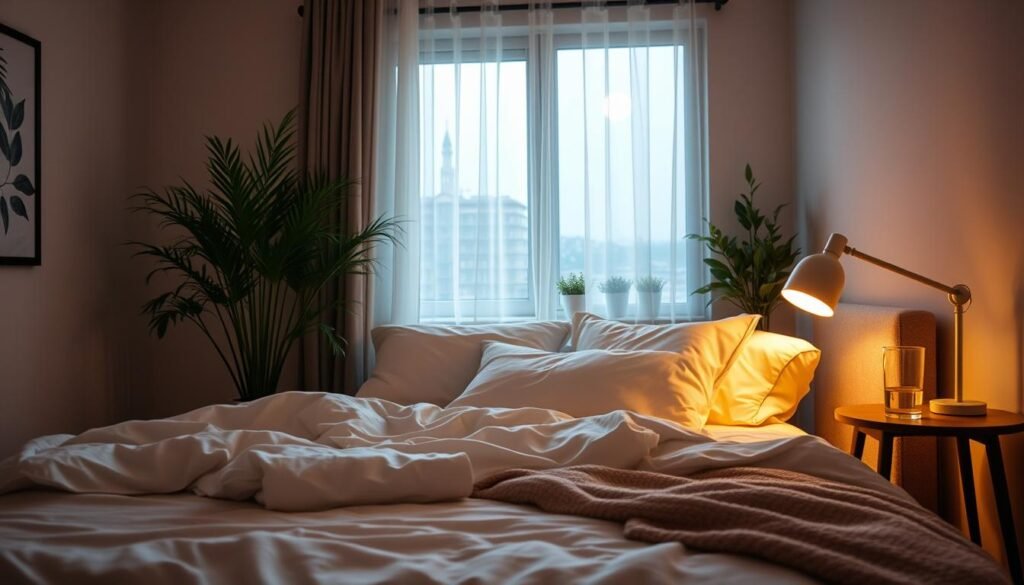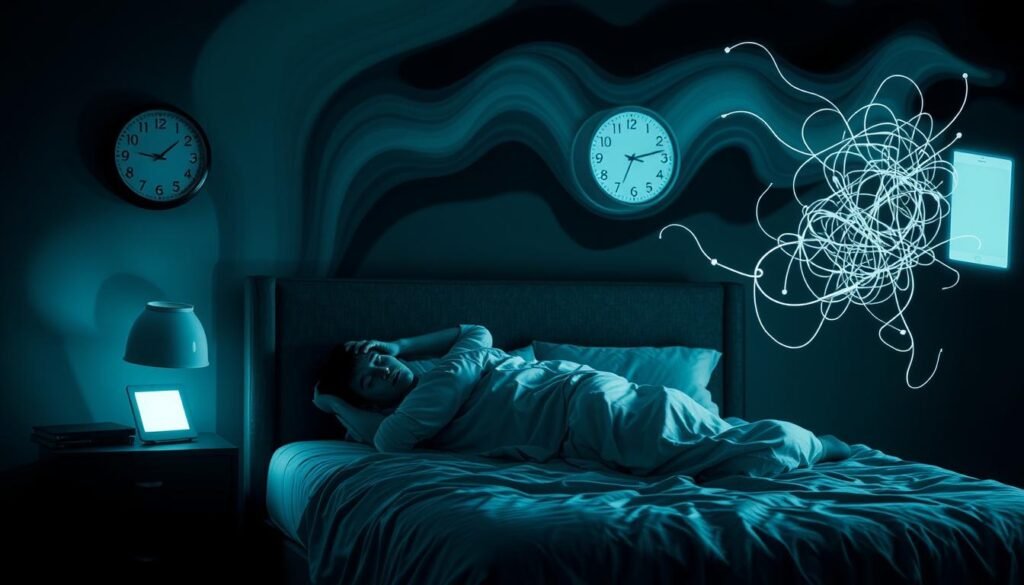Did you know that transient insomnia symptoms affect 30 to 35 percent of people? This fact highlights how common sleep disorders are these days. Insomnia affects an estimated 10% to 30% of adults. It’s crucial to look at insomnia treatment guidelines beyond just sleep meds. Many are on the lookout for expert sleep solutions. They want ways that bring long-term relief. This article will explore how to combat insomnia. We’ll dive into treatments such as Cognitive Behavioral Therapy, changing lifestyles, and managing meds. The goal is to help those struggling to find peaceful sleep.
Key Takeaways
- Transient insomnia affects 30-35% of the population.
- Cognitive Behavioral Therapy for Insomnia (CBT-i) is a first-line treatment.
- Over 25% of patients use over-the-counter sleep aids.
- Effective sleep strategies include relaxation techniques and sleep hygiene.
- Chronic insomnia medication should be a secondary option to CBT-i.
- Understanding risk factors such as age and psychiatric diagnoses is crucial.
- More than 2,500 accredited sleep centers exist in the U.S. for professional support.
Understanding Insomnia: A Common Sleep Disorder
Insomnia is a big problem that a lot of adults face. It’s a sleep disorder where people have trouble sleeping. They might find it hard to fall asleep, stay asleep, or they wake up too early. This leads to not getting enough rest. About 33% of adults have insomnia at some point, with 6% to 10% having serious insomnia disorder.
Insomnia doesn’t just mean you sleep poorly. The Institute of Medicine says 50 to 70 million U.S. adults have trouble sleeping regularly. Nearly 40% of Americans get six hours of sleep or less each night. This lack of sleep has a big price. It costs over $94 billion each year in healthcare for sleep disorders.
Often, people with insomnia also have mental health issues. About 40% to 50% of those with sleep problems have these conditions. Mental health plays a big role in how well you sleep. That’s why treatments like Cognitive Behavior Therapy for Insomnia (CBT-I) are important. CBT-I works well over time and is safer than sleep drugs.
The following table shows details about insomnia and its effects:
| Statistic | Percentage/Amount |
|---|---|
| Adults affected by insomnia | 33% |
| Adults reporting disturbed sleep | 50-70 million |
| Americans sleeping six hours or less | 40% |
| Estimated healthcare costs | $94 billion/year |
| Individuals with comorbid mental illness | 40-50% |
What Are the Insomnia Treatment Guidelines?
About 6% to 10% of people struggle with insomnia. It happens when you can’t sleep for three or more nights a week, for at least three months. This situation can really affect your day-to-day life. That’s why finding the right treatment is so important. The latest guidelines suggest starting with treatments that don’t involve medication for chronic insomnia.
The American College of Physicians recommends trying Cognitive Behavioral Therapy (CBT) first. Studies show that CBT can really help people overcome chronic insomnia. It usually takes about four to eight sessions to see improvement. There are also shorter therapy options that can make your sleep better. These can last from one to four sessions and also offer good advice on improving sleep.
Medications like zolpidem (Ambien), suvorexant (Belsomra), and doxepin can help with insomnia. But, they might lead to serious side effects, such as dementia and bone fractures. That’s why older adults should take lower doses, and why these drugs should only be used for a short time. Doctors must look at each patient’s sleep habits and health conditions to choose the best treatment.
The guidelines for treating insomnia suggest using different methods based on what each person needs. This approach helps treat insomnia symptoms and improves overall health in the long run.
Cognitive Behavioral Therapy for Insomnia
Cognitive Behavioral Therapy for Insomnia (CBT-I) is a primary treatment aiming to improve sleep. It targets the root causes of insomnia. This includes changing thoughts and behaviors that disturb sleep. CBT involves several structured behavioral sleep interventions.
How CBT Works for Better Sleep
CBT’s success comes from its comprehensive approach, adjusted across six to eight sessions. This therapy includes key parts:
- Cognitive Restructuring: It changes wrong thoughts about sleep.
- Stimulus Control: It advises getting out of bed if sleep doesn’t come in 15-20 minutes.
- Sleep Restriction Therapy (SRT): This limits bed time to increase sleep drive. It might cause temporary daytime tiredness.
- Relaxation Techniques: Teaches practices like breathing exercises and progressive muscle relaxation.
These sleep therapy actions show CBT’s unique benefits. They explain how it helps with long-lasting sleep improvement. Chronic insomnia affects 6-10% of people.
Benefits of CBT Over Medication
CBT offers clear advantages over sleep meds. Medicines can give short-term relief but have risks like dependence and drowsiness. CBT is different:
- It tackles the root problems of insomnia, leading to better sleep habits.
- About 70% to 80% of people see improvements with multicomponent CBT.
- It’s a lasting solution without the dangers of sleeping pills.
CBT works for many people, no matter the cause of their insomnia. It’s a step toward restful sleep and better health overall.
Sleep Hygiene Tips for Restful Nights
To get good sleep and boost your health, follow simple sleep hygiene tips. These tips help make your environment and routine perfect for sleeping well.
Creating a Comfortable Sleep Environment
Your bedroom should be dark, quiet, and not too hot or cold. Keep it tidy and limit how much you use devices there. This makes your room a calming place that tells your body it’s time to sleep.
Avoid bright lights at night and try relaxing activities like reading before bed. These steps can make your sleep space even better. By doing this, you’ll wake up less at night.

Establishing a Consistent Sleep Routine
Having a set time for sleep every day helps your body’s clock stay on track. This means better sleep. Keep naps short and early to not mess up your night’s sleep.
Setting bedtime rituals, like doing some easy stretches, helps you calm down. If you need more sleep tips, check out natural sleep aids for more ideas.
Relaxation Techniques to Combat Insomnia
Exploring techniques for relaxation helps those fighting insomnia. Practices like meditation and mindfulness lower anxiety. They make sleep better. Studies show these methods cut down on mental noise that keeps people awake.
Meditation and Mindfulness Practices
Meditation for sleep is known for bringing calm and clear thinking. Mindfulness lets folks live in the now, lowering stress and bringing peace. Using relaxation techniques like deep breathing and visualization also eases into sleep.
Progressive Muscle Relaxation
Progressive muscle relaxation (PMR) helps reduce physical stress linked to insomnia. It involves tensing and relaxing each muscle group. This leads to deep relaxation. PMR makes you aware of stress zones. It helps the body relax and improves sleep.
Managing Medication for Effective Sleep
Managing sleep medication is about knowing the different sleep aids available. This includes prescription and over-the-counter options. These medications help people with chronic insomnia, which affects millions. It’s important to consider the benefits and risks of sleep medications.
Types of Sleep Medications
There are many sleep medications based on what a person needs. The main types are:
- Benzodiazepines: Used until the 1980s, they come in long, intermediate, and short-acting forms.
- Non-benzodiazepine receptor agonists: Medications such as eszopiclone, zolpidem, and zaleplon are newer and may be less habit-forming.
- Orexin inhibitors: Suvorexant and lemborexant help with falling and staying asleep.
Prescription sleep aids need a doctor’s watchful eye to avoid dependency.
Risks and Benefits of Sleep Medications
Sleep medications can ease insomnia but know the risks. Benefits include:
- Better sleep quality and time.
- Less stress and anxiety about sleeping.
- Help for short-term sleep problems.
However, risks include addiction, withdrawal, and daytime sleepiness. Benzodiazepines, especially, can have severe side effects. Thus, medical guidance is vital. Regular checks ensure safe and effective use of these medications.
| Medication Type | Common Brand Names | Key Benefits | Potential Risks |
|---|---|---|---|
| Benzodiazepines | Temazepam, Lorazepam | Effective for short-term relief | Risk of dependence and withdrawal |
| Non-benzodiazepine Agonists | Zolpidem, Eszopiclone, Zaleplon | Reduced risk of habit formation | Daytime impairment; memory issues |
| Orexin Inhibitors | Suvorexant, Lemborexant | Improved sleep onset and maintenance | Limited long-term data |

Alternative Therapies for Sleep
Many people are now choosing alternative sleep therapies to beat insomnia. They try things like melatonin supplements and herbal fixes to sleep better. Looking into these options can find what works best for each person.
Exploring Melatonin and Valerian Root
Melatonin is known as a natural helper for sleep. It helps control when we sleep and wake up. People with sleep troubles may find melatonin boosts their sleep quality. Valerian root’s benefits are still being studied. Traditionally, it’s used to calm down, but its real impact on sleep isn’t fully known yet. There’s room to learn more about it.
Acupuncture and Yoga for Sleep Improvement
Acupuncture is gaining fans as a sleep aid. It’s a practice from China that helps relax and lower stress. These are vital for better sleep. Yoga, too, can help get a good night’s sleep.
Studies show yoga before bed can make sleep patterns better. These methods give options beyond just taking medicine for sleep problems.
Managing Circadian Rhythms for Better Sleep
Managing your inner clock is key to better sleep and well-being. This clock controls when you wake up, hormones, and your body’s temp. Learning to use light the right way and plan when you sleep makes a big difference.
The Role of Light Exposure
Light is crucial for our inner clocks. Daylight tells us when to wake up. Dimmer light at night tells our bodies it’s time to sleep. Here’s what to remember about light:
- Morning sunlight helps set our body clock.
- Blue light from screens at night can mess up our sleep, so use gadgets less before bed.
- Getting sun daily keeps our sleep-wake cycle regular.
Timing Your Sleep Schedule
Having a regular sleep time helps your body clock run smoothly. Try changing your sleep and wake-up times slowly, by an hour. Eating at odd times or not getting enough sleep messes up your body clock. Try these tips:
- Stick to a bedtime and wake-up time that’s the same every day.
- Avoid big meals and caffeine before sleeping.
- Eat breakfast early and stay active to help set your body clock.
Lifestyle Changes for Better Sleep
Improving your lifestyle can really boost your sleep quality. Focus on getting enough exercise and eating right. This can help you sleep better at night.
Importance of Regular Physical Activity
Regular exercise and good sleep go hand in hand. Working out in the morning helps you sync with your body’s natural clock. Studies show that exercising every day can improve your sleep.
Exercise also helps you stress less, making it easier to sleep. But remember, avoid intense workouts before bedtime. They can keep you awake.
Nutrition and Sleep Quality
What you eat affects how well you sleep. Eating lots of saturated fats and sugars might harm your sleep. Instead, eating more fiber can help you sleep more deeply.
Avoid big meals and drinks like caffeine and alcohol before bed. Watching your late-night snacks can also better your sleep. As we get older, it helps to drink less caffeine.
| Factor | Impact on Sleep Quality |
|---|---|
| Physical Activity | Enhances sleep by regulating body temperature and energy levels. |
| Nutritional Fiber | Increases deep sleep and overall sleep effectiveness. |
| Saturated Fat & Sugar | Reduces deep sleep and can lead to unrestful nights. |
| Late-Night Caloric Intake | May disrupt peaceful sleep and overall sleep quality. |
| Regular Wake-Up Time | Helps the body adjust to a healthy sleep routine. |
Trying different lifestyle changes can show what works best for better sleep. It’s important to find what works best for you specifically.
Addressing Underlying Causes of Insomnia
Exploring insomnia’s root causes is key. It can stem from mental issues like anxiety and depression. It can also come from physical conditions. Often, insomnia points to many contributing factors. This means a detailed check-up is needed to customize the right treatment.
Identifying Medical and Psychological Factors
Many factors can cause insomnia, impacting life greatly. Issues like chronic pain, anxiety, and stress mess with sleep. By fully checking one’s health, these factors can be found. This leads to the right treatment plan. Addressing these root causes can make sleep treatments and medicines work better.
Evaluating Medication Side Effects
Medications might disrupt sleep. Some can mess with sleep patterns or make insomnia worse. Seeing doctors regularly lets people change medications if needed. This action can lessen insomnia symptoms, offering relief. Handling medications carefully is key to overcoming insomnia in the long run.

Seeking Professional Help for Insomnia
Many people face sleep problems, like insomnia, which greatly affects their day. When you’ve tried everything and it’s still hard, getting help is key. A sleep expert offers targeted advice and solutions specifically for insomnia’s challenges.
When to Consult a Sleep Specialist
Knowing when to see a sleep expert is important. Dr. Soltis points out that help is needed if sleep troubles last over three months. Signs you may need an expert include:
- Difficulty falling or staying asleep
- Sleep issues that disrupt daily life
- Also dealing with anxiety or depression
- Changes in mood, energy, or health
Sleep experts, like neurologists or psychiatrists specializing in sleep, guide you through diagnosis. They perform detailed evaluations to figure out your specific sleep issues and the right treatments.
What to Expect During Sleep Evaluations
During evaluations, healthcare providers might suggest in-lab studies or at-home assessments. Here’s what happens:
- They’ll review your sleep diary and habits.
- You might need sleep studies to track your sleep quality.
- Then, they’ll make a treatment plan tailored for you.
It helps to track your sleep before your first appointment. This thorough method helps with the right evaluation and moves you towards better sleep. If you’re looking for treatment ideas, check out sleep therapy options for more information.
Insomnia Treatment Guidelines: Building Your Plan
Creating a personalized sleep treatment plan is key. It understands that everyone’s situation is different. It is a team effort between healthcare professionals and patients. Together, they lay the foundation for managing insomnia.
A mix of strategies works best to treat this common sleep disorder. This includes changes in lifestyle and therapy.
A key approach is using personalized insomnia strategies. Cognitive behavior therapy (CBT) is very effective, studies show. Mixing behavioral treatments with lifestyle changes makes the therapy better.
Using a guideline application helps keep track of progress. It helps adjust the plan when needed. Monitoring different aspects, like sleep hygiene, is key. A strong plan might have these steps:
- Regular bedtime and wake-up time.
- Changing pre-bedtime activities.
- Looking at sleep environment factors.
- Using relaxation methods like meditation.
Doctors may suggest extra treatments too. Acupuncture or light exercise can help. These methods can greatly benefit those with chronic insomnia. Keeping track of progress helps tailor personalized insomnia strategies better.
| Strategy | Description | Effectiveness |
|---|---|---|
| Cognitive Behavioral Therapy (CBT) | Change negative sleep thoughts and actions. | High; 73% improved in a study. |
| Sleep Hygiene | Make a good sleep environment. | Moderate; base for better sleep habits. |
| Acupuncture | Needles used to ease insomnia symptoms. | Studies show it’s effective. |
| Relaxation Techniques | Includes meditation and deep breathing. | Helps lessen sleep anxiety. |
| Pharmacologic Treatment | Drugs for short-term, severe cases. | Used for severe insomnia scores. |
Making a good sleep plan needs many steps. It is tailored to each person. Every part is important for sound, renewing sleep. This is vital for health and being productive.
Conclusion
To effectively tackle insomnia, it’s essential to use a blend of strategies. Research shows that Cognitive Behavioral Therapy for Insomnia (CBT-I) works well for long-term relief. It’s often the first choice for treatment, emphasizing the mental and behavioral aspects of sleep problems.
Adding lifestyle changes and sleep hygiene can greatly improve results. For people looking at medication, drugs like eszopiclone and zolpidem may help. Yet, it’s important to be careful because of their possible side effects.
The best strategy combines cognitive-behavioral methods and good sleep habits. If needed, medication should be taken with a doctor’s advice. This comprehensive method is vital for better sleep and health.
Every year, over 5.5 million outpatient visits focus on insomnia. This highlights the need to recognize what affects our sleep. Changing behavior to improve sleep can have a big impact, as detailed here. With the right knowledge and effort, we can improve our sleep and well-being.